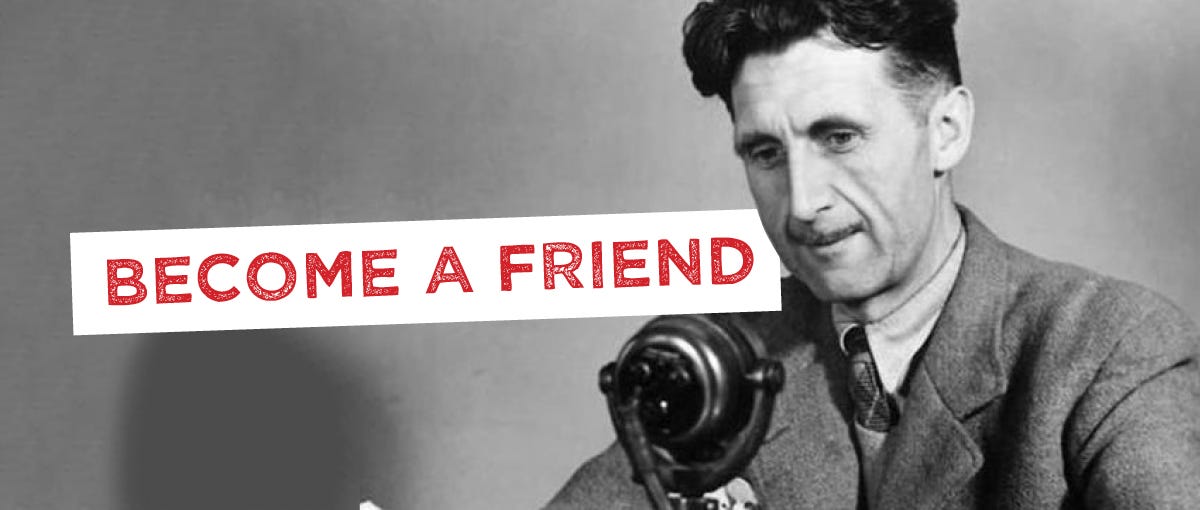"All revolutions are failures, but they are not all the same failure."
First published February 1946
Today’s extract comes from an essay Orwell first wrote in 1944, on the novelist and journalist Arthur Koestler (author of Darkness at Noon). Orwell and Koestler went on to become close friends and intellectual collaborators. Read the piece in full on our website.
To take a rational political decision one must have a picture of the future. At present Koestler seems to have none, or rather to have two which cancel out. As an ultimate objective he believes in the Earthly Paradise, the Sun State which the Gladiators set out to establish, and which has haunted the imagination of Socialists, Anarchists and religious heretics for hundreds of years. But his intelligence tells him that the Earthly Paradise is receding into the far distance and that what is actually ahead of us is bloodshed, tyranny and privation. Recently he described himself as a ‘short-term pessimist’. Every kind of horror is blowing up over the horizon, but somehow it will all come right in the end. This outlook is probably gaining ground among thinking people: it results from the very great difficulty, once one has abandoned orthodox religious belief, of accepting life on earth as inherently miserable, and on the other hand, from the realization that to make life liveable is a much bigger problem than it recently seemed. Since about 1930 the world has given no reason for optimism whatever. Nothing is in sight except a welter of lies, hatred, cruelty and ignorance, and beyond our present troubles loom vaster ones which are only now entering into the European consciousness. It is quite possible that man’s major problems will never be solved. But it is also unthinkable! Who is there who dares to look at the world of today and say to himself, ‘It will always be like this: even in a million years it cannot get appreciably better?’ So you get the quasi-mystical belief that for the present there is no remedy, all political action is useless, but that somewhere in space and time human life will cease to be the miserable brutish thing it now is.
The only easy way out is that of the religious believer, who regards this life merely as a preparation for the next. But few thinking people now believe in life after death, and the number of those who do is probably diminishing. The Christian churches would probably not survive on their own merits if their economic basis were destroyed. The real problem is how to restore the religious attitude while accepting death as final. Men can only be happy when they do not assume that the object of life is happiness. It is most unlikely, however, that Koestler would accept this. There is a well-marked hedonistic strain in his writings, and his failure to find a political position after breaking with Stalinism is a result of this.
The Russian Revolution, the central event in Koestler’s life, started out with high hopes. We forget these things now, but a quarter of a century ago it was confidently expected that the Russian Revolution would lead to Utopia. Obviously this has not happened. Koestler is too acute not to see this, and too sensitive not to remember the original objective. Moreover, from his European angle he can see such things as purges and mass deportations for what they are; he is not, like Shaw or Laski, looking at them through the wrong end of the telescope. Therefore he draws the conclusion: This is what revolutions lead to. There is nothing for it except to be a ‘Short-term pessimist’, i. e. to keep out of politics, make a sort of oasis within which you and your friends can remain sane, and hope that somehow things will be better in a hundred years. At the basis of this lies his hedonism, which leads him to think of the Earthy Paradise as desirable. Perhaps, however, whether desirable or not, it isn’t possible. Perhaps some degree of suffering is ineradicable from human life, perhaps the choice before man is always a choice of evils, perhaps even the aim of Socialism is not to make the world perfect but to make it better. All revolutions are failures, but they are not all the same failure. It is his unwillingness to admit this that has led Koestler’s mind temporarily into a blind alley and that makes Arrival and Departure seem shallow compared to the earlier books.
All rights reserved - this extract remains under copyright in the US and may not be distributed or reused in any way without permission from the Orwell Estate.







Thanks for posting an excerpt from this interesting essay. I read this with a group of students last fall (we were working our way through Orwell's journalism) and was especially brought up by this sentence: "The real problem is how to restore the religious attitude while accepting death as final." In general I think Orwell has a bit of a tin ear on the subject of religion and typically offers a rather crudely oversimplified interpretation of Christianity. So I found that comment quite interesting, because it is one of only a handful of places where Orwell expresses the need for that "religious attitude," even though he finds religion itself no longer possible to believe in.
Remarkably applicable to the present time.